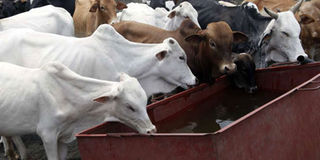Fighting antibiotics resistance in livestock to boost production

Cattles at Giriama ranch, Kilifi County, on September 29, 2017. Animal production and welfare today are pegged on judicious use of antibiotics. PHOTO | LABAN WALLOGA | NATION MEDIA GROUP
What you need to know:
- Misuse of antibiotics is common among animal health practitioners and lay farmers.
- Inappropriate dosages cause resistance as they grant ample time for bacteria to mutate and resist the antibiotic.
The discovery of antibiotics in the late 1920s marked the opening of a new chapter in bacterial diseases management.
When Sir Alexander Fleming discovered that a fungal extract could kill bacteria, he extrapolated this to the treatment of diseases, which were killing people on a pandemic scale.
The many casualties in the Second World War gave an impetus to the commercialisation of antibiotic production.
Penicillin was his first antibiotic to be produced and it was christened the wonder drug, due to its powers to cure diseases with an efficiency hitherto unknown.
INFECTIONS
More research went into antibiotic production and today, there are hundreds of antibiotics in the market targeting various types of bacterial infections.
Animal production and welfare today are pegged on judicious use of antibiotics.
The drugs have extended human and animal lifespan through the cure of many bacterial infections.
The livestock sector is a leading consumer of antibiotics.
Owing to their efficiency in disease cure, antibiotics have been called “magic bullets”.
DOSAGE
When used well, antibiotics should remain so.
Unfortunately, this is not the case and a greater problem is in the offing if humanity doesn’t heed the call of the antibiotics forefathers.
The fathers of antibiotics, despite marking such a great step in human and animal health, gave a caveat – that antibiotics if not used well, there will come a time when this potent will be lost.
The active ingredients in antibiotics used in humans are like those used in livestock, the only difference being the dosage and this is important when it comes to the development of resistance.
PROFESSIONALS
Misuse of antibiotics is common among animal health practitioners and lay farmers.
Misuse of antibiotics is rampant among farmers even when the law requires they be administered by professionals.
Antibiotics should be dispensed only under prescription.
A farmer will not have the requisite information on what diseases a given antibiotic treats, the dosage and administration.
This is crucial information anybody handling antibiotics must have.
Inappropriate dosages cause resistance as they grant ample time for bacteria to mutate and resist the antibiotic.
FOOD CHAIN
Overdosing can be fatal. Most farmers don’t observe withdrawal periods.
This is the time indicated by manufacturers, which has to elapse before any product from the treated animal is safe for consumption – normally meat and milk.
Why is this important? Because antibiotics once administered percolate throughout the body and will be removed over a period of time.
During this time the meat and milk of such animals will have the antibiotic and its consumption equals taking the drugs albeit in smaller doses.
The seepage of antibiotics into the human food chain is another cause of antibiotic resistance.
AWARENESS
Together with the Ministry of Health, and, in collaboration with FAO, WHO, the Kenya Veterinary Association and other non-governmental organisations, we have developed a policy and communication strategy to address antibiotic resistance in livestock.
We are working with other stakeholders, key among them the Health ministry, so we can create synergy in mitigating against antibiotic resistance.
Awareness creation on antibiotic resistance among health professionals and the public has started.
We recently joined the rest of the world in celebrating the antibiotic resistance awareness week.
The production of antibiotics is expensive and time consuming; making antibiotics resistance so costly.
We have to jealously guard against antibiotic resistance through judicious use of what we have as we can’t afford the cost of total antibiotic resistance.
Dr Tuimur is the principal secretary, State Department for Livestock in the Ministry of Agriculture, Livestock, Fisheries and Blue Economy. [email protected].




